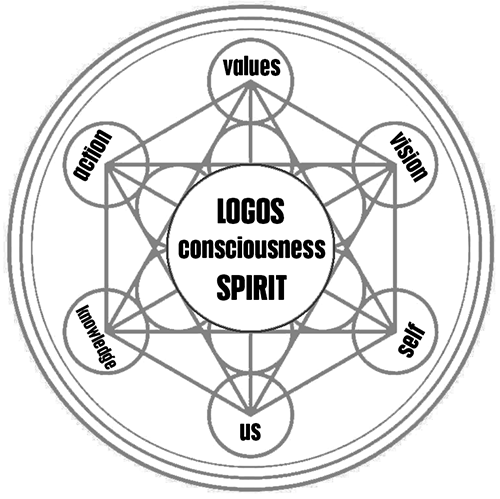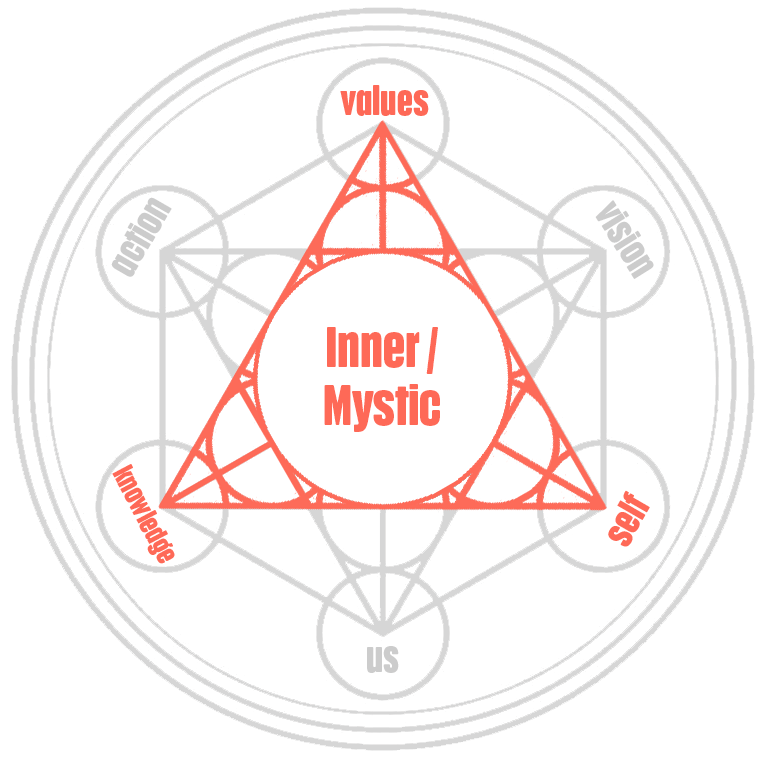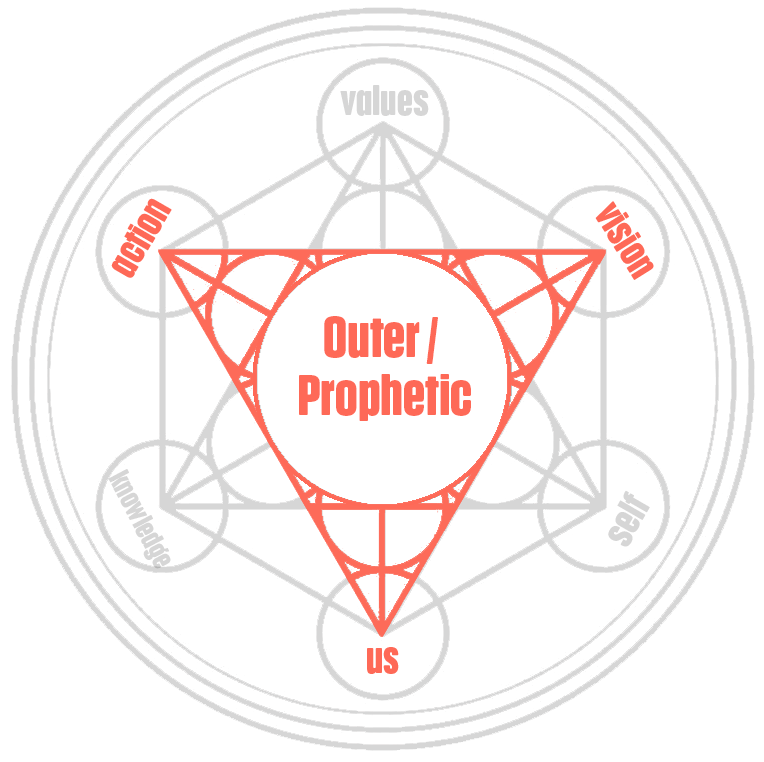

Framework
The strategy for this movement includes meeting in dinner parties for connecting in person, coupled with a social mobile app to guide and connect us globally. It involves educating ourselves about the things that inspire and empower us, and taking actions in groups or alone, sustainably, within our emotional and energetic limits.
The diagram at left shows a seven point framework, based on the sacred geometry of the Metatron, or the six pointed star, referenced in the Talmud and Islamic scriptures. Here it is a system for describing the seven key elements of self empowerment and collective change, drawn from the lessons of successful movements and our global wisdom traditions.
The most dramatic successful social change movements of the 20th Century, led by Gandhi, Nelson Mandela, and Martin Luther King Jr. had one big thing in common: An orientation to Spirit, or Truth Force (satyagraha) as Gandhi called it, that sense of the transcendent good which moves through all life and is life. It is that which is beyond our individual self-concerns, and unites us in the love-wisdom which includes and transcends self concern. You may call it what you wish, God, Love, Consciousness, or if you are atheist, the Logos, for example – the Greek term for “word” or the highest good – that which orients us to what brings about the greatest good for us as individuals, society, and world. It is this orientation to the mystery of the Presence which inspires, fortifies and lifts us out of fear and into greater possibilities. Historically, whenever a peoples’ fearlessness overcame the fear-based tactics of the establishment, the people won.
We are facing the crises we are in right now because of the core existential disconnect we have from the sense of the sacred, from that which has traditionally and indigenously defined who and what we are as a people. The sacred defined our place in the cosmos, and gave our lives connection and meaning. The rationalist materialist worldview which has dominated Western culture for 500 years proposes that we live in a meaningless, separate and purposeless universe, where religion is considered an outdated superstition, ascribed to by the weak and simple-minded.
When we assert the importance of the Sacred, whether it’s through a religious path or as an atheist, we come into relationship with the core mystery of this universe – presence, life, love and wisdom – which orients us to our greatest strength, individually and collectively, compassionately and courageously.

The Inner / Mystic
Values, Self, Knowledge
Values
The themes of the mystic and the prophet, the inner and the outer focus on the spiritual path, run throughout different wisdom traditions. They reflect the need to turn within to find insight, inspiration and renewed energy; and the need to turn outward to bring our inner experience of love and wisdom into the healing of the world. The first inner or mystic aspect in our framework appears as values and principles, as in God’s covenant in the Abrahamic faiths, and the Dharma in the East. Or from a secular point of view, they are the Universal Declaration of Human Rights defined by the Geneva Convention. Such values have largely fallen out of favor in popular culture and many activist groups, since these traditional values have often been associated with the abusive power of the church. But as Gandhi, King and Mandela, and many other effective leaders have said, without strongly shared and comitted values, any group effort will tend not to be able to hold and transform anger, fear and hatred into effective positive action, or into shared healing. The group will tend to self destruct under the weight of it’s own unprocessed shadow, as people play out their trauma on each other. (Witness the Occupy movement which did not have a clearly stated and shared commitment to values and principles.)
The agreements proposed here are:
- I agree to seek the highest good in my thoughts, words and deeds.
- I agree to speak the truth and honor my word and commitments.
- I agree to treat others as I’d like to be treated – with respect and care.
- I agree to take responsibility for my own experience, feelings and reactions.
- I agree to resolve conflict and resentments nonviolently, in private and as quickly as possible.
- I agree to focus on the positive, on the outcomes we seek, to not dwell in the negative, to not gossip.
- I agree to take myself lightly and keep my sense of humor
Self
The invitation to anyone drawn to this path is to come, in person and virtually, as you are. To bring your rage, your despair, your anxiety and depression, your numbed-out disociation, your overwhelm and avoidance. And bring your joy, your hope, your love and your light. When we first acknowledge where we are internally in the face of what’s happening in the world, and come together, we no longer have to feel alone. And when we come together in our rage, hopelessness, grief, etc., another kind of hope can show up when we feel our togetherness. The power of us.
When we tap a sacred wisdom tradition, spiritual or secular, and apply it to the change we wish to affect in the world, in community, our personal growth and awakening speeds up exponentially. Our sense of connection, belonging, agency, meaning and purpose thrives in our lives. Online courses will be available for healing trauma, rewiring the brain out of fear and into possibility, experiencing the awakened state of consciousness, identifying and releasing ways we have internalized disempowering messages saturating us from the dominant culture, and learning how we can manage our time well so we can contribute to this vision in a way that’s manageable and rewarding.
Knowledge
In addition to self knowledge, it’s important that we have shared knowledge about history, the present day and the possible future that can inspire, encourage and clarify our path and strengthen our hope for the future. From history, we can remember the Norwegian revolution and those of Eastern Europe from the 90s – including the Estonian revolution, the Orange revolution in Georgia, the Velvet revolution in Romania, and the Czeck revolution – all are extraordinary examples of the courage, ingenuity and resourcefulness of people who organized non-violently to overcome oppressive regimes.
From the present day, when we remember the enormous emounts of waste, corruption and injustice in the system, we can see that we aren’t lacking the funds to create a better society where everyone can have access to affordable housing, education and health care. We are lacking the political will to spend our resources more effectively. Some examples are the trillions of dollars that go missing every year in the pentagon, the injustice of fractional reserve banking, and the fact that the top 10% of the wealthy control 90% of the wealth in the U.S.
When we consider the possible future, the picture is inspiring and exciting. The pathway to a sustainable planet is known. The United Nations 17 Point Plan for Development, as one example, maps a possible future for us. With less than 5% of global GDP, we can create a planet that has a promising and sustainable future. And there are other inspiring paths, the aim here is to awaken each other to them and give our time and energy where we feel called to contribute.

